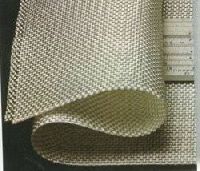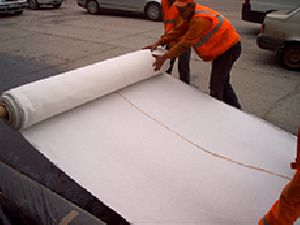
Woven Geotextile
Get Price Quote
Geotextile is a high strength polypropylene woven fabric produced from high tenacity tapes. They are specially designed to be used as a construction material and must have the following functions: separation, filtration, reinforcement, protection and drainage. They find application in construction of roads, dams, erosion control and other similar activities.

HDPE Geomembrane Sheets
Get Price Quote
HDPE Geomembrane Sheet : Product is delivered in large rolls with a width of 2000mm and is a field assembled lining material that cannot be practically fabricated in the shop. All HDPE projects, regardless of size, must be installed by trained installers. HDPE offers the most cost effective liner for large projects. HDPE Geomembranes Liners are manufactured from a nonpolar thermoplastic polymer which is chemically very stable but forms a melt above 140oC, and so can be extruded at approximately 200oC. Therefore in practice, HDPE geomembranes Flat Extruded sheets cannot be glued by chemical processes and welding by thermal process is the jointing technology of choice. Description of Welding Methods : Areas to be seamed shall be free from dust\debris and dry. In no case shall HDPE Sheet overlap be less than 75mm HDPE Geomembranes sheets are to be sufficiently overlapped up to 150mm to secure sufficient good weld. Weather conditions can be of extreme influence to the weld quality; therefore welding or Seaming is prohibited during rain without special protection. Seaming is usually prohibited at temperatures of less than + 4°c and above + 75oc. Subgrade must be maintained in good condition to guarantee permanent bearing capacity (in case welding equipment is dependent on ground pressure). Prior to commencement of welding, test welds are to be executed and tested to all weld parameters. No vehicular traffic shall travel on the HDPE geomembrane sheet other than an approved low ground pressure Vehicle or equivalent Sand bags or equivalent ballast shall be used as necessary to temporarily hold the geomembrane material in position under the foreseeable and reasonably - expected wind conditions. Geomembrane placement shall not be done if moisture prevents proper subgrade preparation, sheet placement, or sheet welding. The HDPE geomembrane shall not be allowed to "bridge over" voids or low areas in the subgrade. The HDPE geomembrane shall rest in intimate contact with the subgrade. Welding or Seaming shall primarily be performed using automatic fusion welding equipment and techniques. Extrusion welding shall be used where fusion welding is not possible such as at pipe penetrations, patches, repairs and short (less than a roll width) runs of seams. Welding or seaming of HDPE Geomembrane is a thickness dependant technique that requires a minimum material thickness to create an effective weld without distortion. Extrusion welds in sheet less than 1.0 mm thickness are not recommended. Extrusion welds in 1.0 mm thick HDPE Sheet show some distortion and can sometimes be very difficult to prepare around intricate pipe penetrations and mechanical attachments. 1.5 mm thick HDPE Geomembrane sheet can be reliably extrusion welded in most situations and is recommended in most applications. Welds in 2.0 and 2.5 mm thick HDPE Sheet are excellent and are recommended in applications that require exceptional durability. Extrusion welds are very slow and are typically used only for repairs and details. Hot wedge welders have become the technique of choice for HDPE installers over the past several years. Wedge welders are fast, produce excellent welds in HDPE sheet from 1.0 mm to 2.5 mm thickness, and can be easily tested. Hot wedge welders today produce two weld tracks separated by a small unbonded channel. By sealing off both ends of this channel, and then pumping it full of air, entire seams can be checked quickly and effectively. Fishmouths or excessive wrinkles at the weld or seam overlaps shall be minimized and when necessary cut along the ridge of the wrinkles back into the sheet so as to effect a flat overlap. The cut shall be terminated with a keyhole cut nominal 10 mm diameter hole so as to minimize crack/tear propagation. The overlay shall subsequently be welded. The key hole cut shall be patched with an oval or round patch of the same base HDPE Sheet geomembrane material extending a minimum of 150 mm beyond the cut in all directions.
Best Deals from Geosynthetics

Woven Geotextile
Get Price Quote
Geotextile is a high strength polypropylene woven fabric produced from high tenacity tapes. They are specially designed to be used as a construction material and must have the following functions: separation, filtration, reinforcement, protection and drainage. They find application in construction of roads, dams, erosion control and other similar activities. Advantages: Woven geotextiles provide dimensional stability and resistance to the biological and chemical environments normally found in soils Distribution of the applied load across a bigger area thus providing support to the weaker areas To improve drainage system To filter the water seeping through to the ground

Hdpe Geomembrane Sheet
Get Price Quote
We are the main supplier of this product.

Membranes
Get Price Quote
Soft tech Stocks a wide range of Dow Filmtec Membranes, Hydranautics Membranes, Koch Fluid Systems Membranes, Toray Membranes

ld liner
Get Price Quote
ld liner, polypropylene liner

Glass Geo Grid
Get Price Quote

membrane
Get Price Quote
membrane, divinyl benzene

Reverse Osmosis Membranes
Get Price Quote
Reverse Osmosis Membranes, Reverse Osmosis Antiscalant, Iron Removal Media

ldpe liner
Get Price Quote
ldpe liner